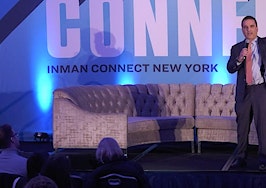Whether you’re a rookie agent, a rising team leader or an established veteran broker, we can all benefit from sharpening our skills. Follow our “Back to Basics” series to learn fundamental strategies, tactics, philosophies and more from real estate pros across the industry.
This article is an excerpt from Joe Rand’s newest book, How to be a Great Real Estate Agent.
My late father was a doctor for about 30 years, and developed an immensely successful medical practice. His patients absolutely loved him, and he loved them back.
About five years after he retired, we were walking through a local mall. Suddenly a woman came up to us, greeting him enthusiastically, giving him a hug. They talked for a bit, just social chit-chat. Later, when she left, I asked him who she was.
He said, “She’s a patient.”
Now, my father at that point had been retired for years, and probably hadn’t even seen that particular patient for a few years before that. But it didn’t matter. She was still his patient. She would always be his patient. Again, not literally — if she’d asked him to write a prescription for her, he would have politely declined. She wasn’t under his care at the time. But his mindset was clear: She was a “patient.” And in that same way, her mindset was clear: He was her doctor.
That’s how we need to think about the people in our lives. They’re clients, even if they’re not buying or selling right now. And we should treat them that way —attending to their needs even when they’re not in the market, for the simple reason that they’re your clients, and you should take care of them. That’s our job.
Listen, I know what you’re thinking: “That’s my job? That doesn’t sound like such a good job! Why do I want to be a real estate agent for people who aren’t even buying or selling? You want me to do all this work for free?”
Yes, that’s precisely what I want you to do. Work for free. Why? Because no one ever paid for the Zestimate, either. And yet, by addressing consumers’ need to know what their home was worth, Zillow built a relationship with those consumers.
They visited the site once, then visited again, then bookmarked it, then got the app, and eventually started to think of Zillow as their “go-to” resource for real estate information. The relationships that Zillow forged with its user base had value, and eventually, Zillow figured out a way to monetize that value.
So should we. We all have durable, existing relationships with our friends, family, past clients, current clients, neighbors, former work colleagues and other people in our communities. Those relationships have value.
We also have less tangible but potential relationships with all the random people we come into contact with in our work: the looky-loo open house visitors from Sunday, the unrepresented FSBO (for-sale-by-owner) seller we called last month, the long list of people who we usually think of as “dead leads” because they weren’t really in the market at the time we talked to them. And, yes, that florist from the cocktail party conversation we just met. Those relationships have value, too.
And the key to realizing that value is simple: treat them all like my dad treated his patients. Treat them like clients.
Adopt them as your clients, position yourself as their real estate agent. Think expansively about what they need, creatively about how you can give it to them, and then execute as if they’re paying you — even if they’re not. Foster a dynamic in which they start to believe they “have” a real estate agent just like they have an accountant and a dentist and a hair stylist.
Now, I don’t mean that you should literally treat everyone like a client. You’re not going to meet someone at a cocktail party and then give them a bunch of disclosures to sign. You’re not going to assume a fiduciary responsibility for a seller who hasn’t signed a listing with you yet, any more than my father would have given that patient a prescription. I’m just talking about your attitude, your mindset, your approach.
That’s how you build a great business. Create relationships, cultivate relationships and develop relationships. They have value. Maybe you won’t realize that value today or tomorrow, but eventually you’ll get something from the work you put in.
Why? Because everyone moves eventually. All those people that you cultivate as your “non-transactional clients” will eventually become “transactional clients” — or, at least, you’ll have the opportunity to convert them into transactional clients.
And positioning yourself as someone’s real estate agent is the best way to earn their business: if you can forge a relationship with them by simply being a resource to answer their real estate questions or provide them with unpaid non-transactional services, they’re more likely to turn to you when they need paying, transactional services.
Think of it this way: Are you planning on being in the business in five years? Ten years? If so, wouldn’t it be nice to depend on a handful (or more) deals every year from these non-transactional clients that you’ve invested small amounts of money and time in every year? Isn’t it worth doing a little work this year and next year and the year after that for a piece of business you can close in five years?
Ultimately, it’s always going to be more cost- and time-effective to cultivate those existing relationships than to try to start new ones. It’s a standard business cliche: It costs a lot more to acquire a new client than it does to retain an existing one.
Just think about all the money and energy you probably spend trying to generate leads. Wouldn’t it be a lot easier and cheaper to cultivate deeper relationships with your existing clients — or, at least, the people who should be your clients, if you actually opened up your perspective to treat everyone in your life, and everyone you meet through your business, as a client?
The point is, you already have a lot of clients, and you meet new ones every day. You just don’t treat them like clients, so they don’t think of you as their real estate agent.
At least, not yet.
But they will.
- Part 1: Do your clients tell their friends about you?
- Part 2: Why you should treat everyone like a client from the moment you meet
- Part 3: How a spirit of generosity will win you new business
- Part 4: Make it about them: How to win trust and more clients
- Part 5: Why don’t we think about clients’ specific needs?
Joe Rand is the author of How to be a Great Real Estate Agent and Disruptors, Discounters, and Doubters. He is the chief creative officer of Better Homes and Gardens Real Estate | Rand Realty in New York and New Jersey, a contributor to Inman News, and a regular blogger at joerand.com.













